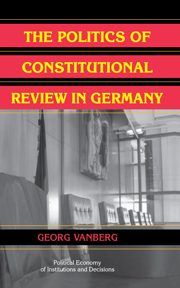Book contents
- Frontmatter
- Contents
- Acknowledgments
- Titles in the series
- 1 The Politics of Constitutional Review
- 2 Implementation, Public Support, and Transparency
- 3 The Federal Constitutional Court in Comparative Perspective
- 4 Transparency and Judicial Deference
- 5 From the Inside Looking out: Judicial and Legislative Perceptions
- 6 Pushing the Limits: Party Finance Legislation and the Bundesverfassungsgericht
- 7 Prudent Jurists
- Bibliography
- Index
3 - The Federal Constitutional Court in Comparative Perspective
Published online by Cambridge University Press: 11 July 2009
- Frontmatter
- Contents
- Acknowledgments
- Titles in the series
- 1 The Politics of Constitutional Review
- 2 Implementation, Public Support, and Transparency
- 3 The Federal Constitutional Court in Comparative Perspective
- 4 Transparency and Judicial Deference
- 5 From the Inside Looking out: Judicial and Legislative Perceptions
- 6 Pushing the Limits: Party Finance Legislation and the Bundesverfassungsgericht
- 7 Prudent Jurists
- Bibliography
- Index
Summary
In the remainder of the book, I explore and test the empirical implications of the theory laid out in the previous chapter by applying the framework to the FCC. In the roughly fifty years since its creation, this court has emerged as “the most active and powerful constitutional court in Europe” (Kommers 1994:470), and it has served as a model for many of the new constitutional courts of Eastern Europe (Schwartz 2000). Aside from the intrinsic importance of this court as one of the most significant legal actors in the world today, the FCC therefore provides an appropriate testing ground for the argument. Before we dive into the details of the politics of constitutional review in Germany, it is useful to briefly survey the Bundesverfassungsgericht and its history. How was this court established? How is it organized, and what are its powers? And how does it compare to other European constitutional courts? This chapter provides answers to these (and other) questions. Readers who are already familiar with the structure, jurisdiction, and powers of the FCC can skip without much loss to the next chapter.
I begin with a short account of the history and establishment of the court. One of the implications of the argument in the previous two chapters is that establishing a court, maintaining its institutional integrity, and generating compliance with its decisions constitute separate (though interrelated) problems.
- Type
- Chapter
- Information
- The Politics of Constitutional Review in Germany , pp. 61 - 94Publisher: Cambridge University PressPrint publication year: 2004



